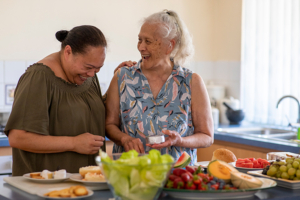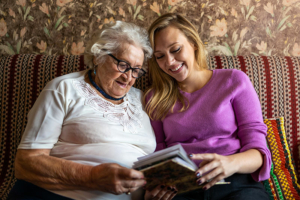How to Talk to Older Loved Ones About Aging Care

These tips can help you talk to older loved ones about aging care in a calm and respectful way.
Maybe you remember having “the talk” with your parents about those cringeworthy pre-teen topics. If you thought that was uncomfortable, brace yourself for having to talk to older loved ones about aging care issues and concerns you are noticing at home! This is often very difficult, for several reasons:
- Your parents may resent what appears to be a reversal of roles or being told what to do
- They could be in denial that there’s a problem at all
- They could feel threatened and fearful of losing independence and the freedom to make their own choices
How can you overcome these very valid feelings to come to a place of acceptance about home care services? Try these tips as a starting point to talk to older loved ones about aging care:
- Plan the conversation: what you will discuss, who will attend, where you can best talk without distractions.
- Think through what it would be like to be in your parents’ shoes and exactly how you would want the conversation to go.
- Resolve to remain calm and respectful through the entire discussion, never attempting to parent your parents.
- Listen to your parents’ worries with an open mind and without preplanned responses.
- Realize there may be more than one solution – and, that it often takes more than one conversation to achieve agreement.
Before approaching your parents, practice what you want to say with someone you trust to give you straightforward feedback. Role-playing is a good strategy to refine your presentation and words and to help you gain confidence.
When you are ready to talk with your parents, be prepared for any outcome. In a perfect world, they will agree with your concerns and be open to having the support of a home care professional. It’s certainly possible that they share your concerns, but were unsure how to broach the subject with you. But likewise, be prepared for resistance, defensiveness, and possibly even anger.
In the event that the discussion is producing heightened emotions and you are reaching an impasse, shelve the conversation and try again later. It may be beneficial to include someone your parents trust and respect in a subsequent conversation, such as a close friend or medical professional.
When you are ready to explore home care options for your parents, contact Responsive Home Care. We can start out with minimal support, such as meals, transportation accompaniment, or light housekeeping, and slowly work up to more care once your parents feel comfortable with their caregiver.
We understand how difficult it can be for someone to acknowledge the need for assistance at home. Our goal is always to cultivate an environment of independence in which each individual in our care remains as much in control of all of life’s decisions as possible. You can connect with us 24/7 at (954) 486-6440 for more information about our highly personalized home care services in Hollywood, Plantation, Lighthouse Point, and the surrounding areas.








 Everyone goes through good days and bad days, and everyone is entitled to negative thinking or irritability every now and then. If you are caring for an older adult who appears to have fallen into a routine of continual negativity and complaining, there could be a reason for it. It’s worthwhile to explore whether or not a health issue may be the culprit for negative mood changes in a senior.
Everyone goes through good days and bad days, and everyone is entitled to negative thinking or irritability every now and then. If you are caring for an older adult who appears to have fallen into a routine of continual negativity and complaining, there could be a reason for it. It’s worthwhile to explore whether or not a health issue may be the culprit for negative mood changes in a senior.

